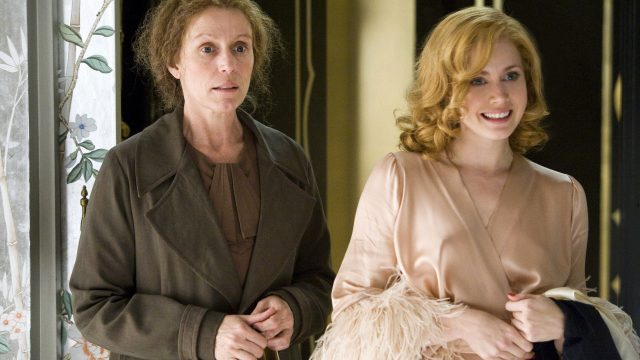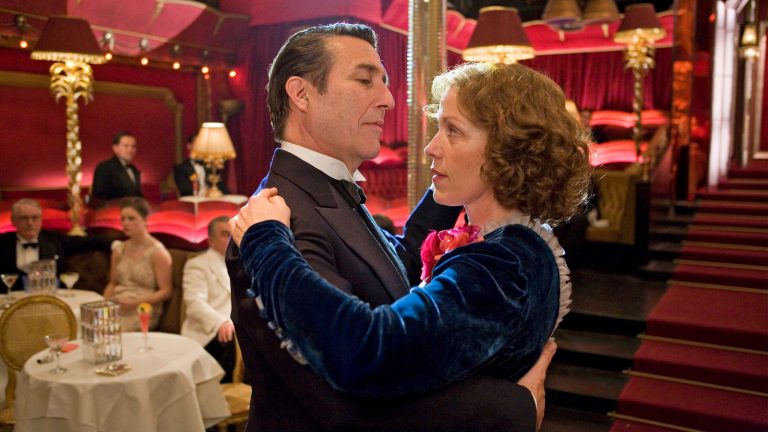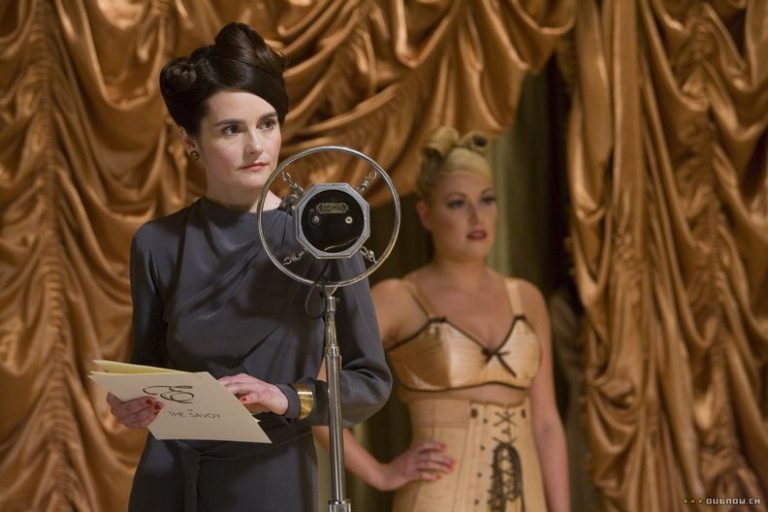Miss Pettigrew is a prime example for me of a subgenre I like to call “Light Comedy Ain’t Slumming,” where directors/writers/actors who have come to be know for more serious work tackle farce or light comedy and show that they’re not just taking an easy job, but that the work can show off their skills and themes just as well as drama. Here, we have a movie that borrows from the screwball comedies of the 1930s but has more than just that going on in its pretty little head.
Miss Pettigrew Lives For A Day is a novel that was published in 1937, written by Winifred Watson, a British novelist from Newcastle who wrote a series of rustic novels (Wikipedia claims that her novel Fell Top is exactly the sort of thing Cold Comfort Farm was satirizing and it makes sense). Pettigrew is Watson’s one urban novel, and it’s a lovely piece of comedy on its own. Of course, being written two years before the movie is set, the World War II foreshadowing is not in it, but the novel doesn’t particularly need it. It’s more of a self-contained rags-to-riches story for Guinevere and her crazy day with Delysia. I ran across it in the 2000s when Persephone Books, a wonderful publisher in London that finds out-of-print works by British women and brings them back to print in fabulous little paperbacks, put out a nice edition that obviously caught a bunch of people’s attention. It’s very much worth your time
The movie involves Miss Pettigrew (Frances McDormand), a stern governess-for-hire in 1939 London. She’s just lost her fourth job and her employment agency isn’t jumping to send her on any more. Desperate (and hungry), she steals a job slip on her way out and heads across town to work for Delysia Lafosse (Amy Adams), an American singer who, as it turns out, is looking for a social secretary rather than a nanny. Delysia is exactly the sort of flighty social butterfly that Miss Pettigrew is not, and hijinks ensue as they romp across town, infiltrating high society and nightclubs.
Miss Pettigrew quickly comes to realize that Delysia is involved with three men: a West End theater maven, a nightclub owner, and a penniless piano player played by Lee Pace (between this and the Hobbit movies I was convinced for a long time that he is British; he is from Oklahoma). From a combination of wanting to keep a job and a growing weird liking for this frippery of a girl, Miss Pettigrew starts helping her to untangle this triangle (quadrangle?) and get Delysia to buck up and make some decisions for herself.
So far, this is all very 1937 and light, champagne comedy. But one of the reasons I love this movie is that there’s a bit more going on here. The War is coming, as in within months, and there is a slight air of desperation over all these proceedings as everyone races around their nightclubs and society functions and a lingerie show (run by the great Shirley Henderson in one of those iron lady performances she does so well). And then Joe shows up.
Joe (Ciarán Hinds) is a lingerie designer involved with Edythe, the Shirley Henderson character, but upon meeting Miss Pettigrew there’s a little frisson of attraction between the two that keeps growing as they run into each other over the course of the day, to the point where their little romance actually ends up overshadowing Delysia’s romance problems in both the storyline of the movie and to her own shock, in Miss Pettigrew’s loyal-to-her-employer head. People say, and probably rightly so, that there’s a bit of a dearth of movies about romance between people who aren’t 25; this movie fills that gap really nicely. It’s such a nice, gentle romance of glances and short conversations and meetings that finally culminates in a conversation in an alley that is simply lovely as they actually talk about who they are.
Now, this one scene is where Miss Pettigrew diverges the most from the novel, and it’s one I want to highlight as an example of how to effectively use source material, twist it, and come up with something different and equally as good. Joe is combined from two characters in the novel and doesn’t show up until about ¾ of the way through; here, he’s much stronger character and you much more feel why Miss Pettigrew would be interested in him. (That, and he looks like Ciarán Hinds.) The whole scene in the alley as they reminisce about their lives and reveal their shared pain from World War I (Miss Pettigrew lost her fiance and Hinds was in the trenches) is original to the movie and the story is all the better for it. They know how bad the last war is and unlike the younger generation of Delysia and her lovers, they know how bad it’s going to be again.
Now of course, this being once again a use of 1939 screwball comedy, everything turns out well in the end. Delysia chooses a man, Miss Pettigrew (now being called by her proper name, Guinevere) finds a happy ending and a meal and everyone walks off into the sunset. Oh, wait, the War is still coming, and what’s lovely about this ending is that the movie doesn’t pretend it’s completely happy. Yes, love has been found…but there’s still a great conflict starting up and everything has a slight tang of darkness to it. It’s a very delicate shading to the ending and I’m always impressed they pulled it off.
Looking back on this, I feel the need to bring up the performances of Amy Adams and Frances McDormand. Ten years on from Miss Pettigrew, it’s worth remembering that both of them can do farce and light comedy like nobody’s business, but somehow since then they’ve just not had the opportunity. The closest for McDormand is her small part in Hail Caesar!; this comes a year after Enchanted for Adams she is still very much in that mode, and she also has The Muppets in 2011, but I would love to see both of them working in this genre again. They both know exactly what they’re doing here and are just really damn good as a comedy duo; Adams gets to be the jokester and McDormand gets to play straight man, until slowly they start to become more equals in these roles. If you like either of them in their comedic performances previous to this, you should really check this out.
(As a final note; this movie has production design and costume work like crazy. It’s really lovely stuff, all the way down to Miss Pettigrew’s awful, desperate dress in the beginning.)




